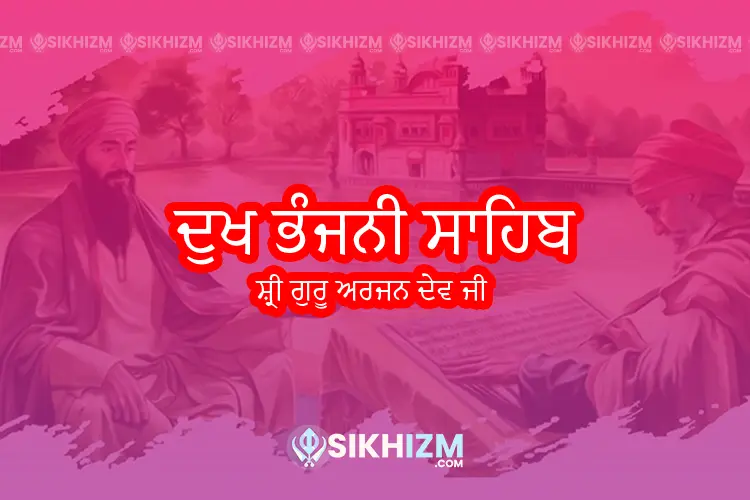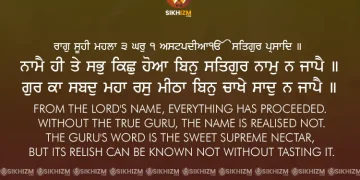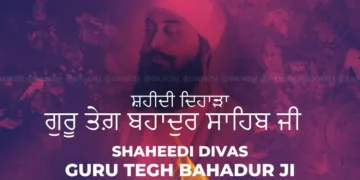Download Dukh Bhanjani Sahib PDF
Experience the divine healing power of the Dukh Bhanjani Sahib by downloading the complete path in PDF format from the link provided below. This sacred composition, authored by Guru Arjan Dev Ji and comprising of 34 hymns in the ragas of Gauri, Sorath, and Bilawal, is an integral part of the Guru Granth Sahib. The PDF features the original Gurmukhi text along with English phonetics and translations at the end, spanning across 49 pages and a compact size of 170 KB.
| Composition Name | Dukh Bhanjani Sahib |
|---|---|
| Author | Guru Arjan Dev Ji |
| Number of Hymns | 34 |
| Ragas | Gauri, Sorath, Bilawal |
| Part of | Guru Granth Sahib |
| Language | Gurmukhi |
| Additional Features | English phonetics and translations |
| File Size | 170 KB |
| Number of Pages | 49 |
Dukh Bhanjani Sahib is a collection of hymns (shabads) composed by the Sikh Gurus and other revered saints. It is a prayer that is recited by Sikhs to seek relief from suffering, pain, and afflictions. The name "Dukh Bhanjani" means "destroyer of suffering", and the prayer is believed to have the power to alleviate both physical and mental suffering. It is often recited at Gurdwaras (Sikh places of worship) and by individuals during their daily prayers. The prayer is also frequently included in the Sikh holy book, the Guru Granth Sahib.
Shabads of Dukh Bhanjani Sahib
Dukh Bhanjani Sahib is a composition of 34 hymns and shabads by Guru Arjan Dev Ji, which are included in the Guru Granth Sahib. It is a collection of verses meant to alleviate the pain and suffering of those who recite it with devotion and understanding.
Here is a brief index of the hymns and shabads included in Dukh Bhanjani Sahib:
- Dukh Bhanjan Tera Naam
- Sooke Harey Kiye Khin Maahe
- Taap Gaye Payi Prabh Saant
- Jis Simrat Dookh Sabh Jaye
- Kot Bighan Hirey Khin Maahe
- Saant Bhyi Gur Gobind Payi
- Netra Pragas Kia Gurdev
- Thir Ghar Besoh Har Jan Pyare
In addition to these hymns, there are also several other verses included in Dukh Bhanjani Sahib, which are meant to be recited in order to alleviate pain and suffering. Many Sikhs recite this composition daily or on special occasions with great devotion and reverence.
Historical and Cultural Context
The composition of Dukh Bhanjani Sahib holds significant historical and cultural importance in Sikhism. It is believed to have been written by the fifth Sikh Guru, Guru Arjan Dev Ji, who compiled the Adi Granth, the first official scripture of Sikhism. The Adi Granth is now known as the Guru Granth Sahib, the holy book of the Sikhs.
During Guru Arjan Dev Ji's time, the Sikh community was facing persecution and oppression from the Mughal rulers. Guru Arjan Dev Ji himself was arrested and tortured by the Mughals, and eventually martyred in 1606. In this context of intense suffering and hardship, Guru Arjan Dev Ji composed Dukh Bhanjani Sahib as a prayer for alleviating the pain and anguish of his fellow Sikhs.
The composition is structured as a series of shabads or hymns, which are believed to have the power to heal physical and emotional ailments. The name "Dukh Bhanjani" itself means "destroyer of suffering". The hymns are addressed to different deities and spiritual beings, including God, the ten Sikh Gurus, and other saints and holy figures.
The historical and cultural context of Dukh Bhanjani Sahib is thus rooted in the struggles and hardships faced by the early Sikh community under the Mughal rule. The composition reflects the Sikh belief in the power of prayer and the importance of seeking solace in a higher power during times of adversity. Today, the recitation of Dukh Bhanjani Sahib remains a significant part of Sikh worship and is often performed as a form of meditation or prayer for healing and well-being.
To enhance your spiritual journey and receive the blessings of Waheguru, we highly recommend downloading this precious gem of Sikh literature today.











Shabad themselves are beautifully written and offer a great deal of insight into the teachings of Sikhism. I appreciated the historical and cultural context that was provided for the hymns, which helped me to better understand its significance. Waheguru ji.